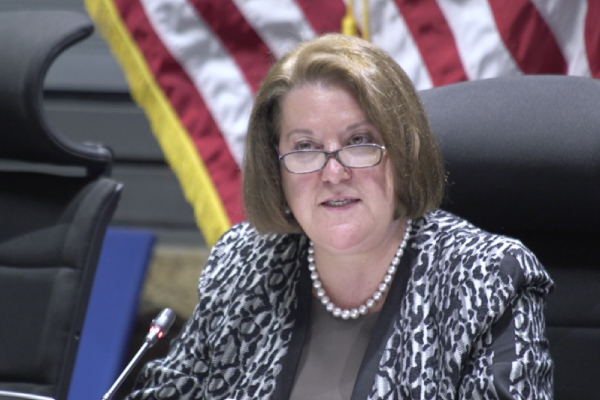The Federal High Court sitting in Lagos has struck out a suit seeking to set aside the convictions of popular actress, Funke Akindele, alias Jenifa, her husband, Abdulrasheed Bello, and 236 others, who were all prosecuted for violating the state’s 2020 lockdown and social distancing order to check the spread of COVID-19.
Justice Akintayo Aluko held that the suit disclosed no reasonable cause of action and was also incompetent.
Funke Akindele and her husband were convicted on April 6, 2020 by the Lagos State Magistrates’ Court in Ogba, days after they held a crowded house birthday party contrary to Lagos State’s social distancing order.
But a Lagos-based lawyer, Olukoya Ogungbeje, approached the court, challenging the constitutionality of the Lagos State Infectious Diseases (Emergency Prevention) Regulations 2020 pursuant to which the affected residents were convicted and sentenced.
The Joint respondents in the suit marked FHC/L/CS/588/2020 are the Lagos State Government, Attorney-General of Lagos State, Commissioner of Police, Lagos State and the Inspector-General of Police.
Mr Ogungbeje also sought, among other reliefs, an order of the court compelling the Respondents jointly and severally to tender a public apology in three widely read newspaper publications for their arrest. arraignment, trial, conviction and sentencenent of those affected.
But the Lagos State Government and the AG opposed him through their counsel, a Deputy Director, Lagos State Ministry of Justice, Adebayo Haroun.
The 1st and 2nd Respondents filed a notice of preliminary objection against the suit on July 10, 2020.
According to them, Section 8 of the Quarantine Act, 2004 allows the governor to make the regulations where the President of Nigeria had not made such regulations.
They contended that the Regulation was made for public safety, public good and protection which is larger and far greater than that of an individual such as the Applicant.
In his judgment delivered on June 2, 2022, the court agreed in part with the government.
Justice Aluko observed that the regulations disclosed in its preamble that the governor made the regulations by virtue of the powers conferred on him by the Lagos State Public Health Law of Lagos State, 2015 and in particular section 8 of the Quarantine Act, and that Sections 8 provides that if regulations under section 4 of the Act was not made by the President, power to make such regulations may be exercised by the governor in respect of his state.
“This means that the regulations made by the governor on the 27/3/2020 is valid within the context of section 8 of the Quarantine Act having been made at a time when the president had not made his own regulations. The Lagos State Infectious Disease (Emergency Prevention) Regulations, 2020 is therefore a subsidiary legislation validly made pursuant to section 8 of the Quarantine Act.
“Contrary to the argument of the Applicant, section 17 of the Regulations actually created certain offences ranging from failure to comply with restriction order, prohibition or doing anything contrary to the provisions of the Regulations. Section 17 (2) of the Regulations provides that any person who contravene the provisions of the Regulations shall be liable under the Quarantine Act, Public Health Law of the State and any other existing law to fine or imprisonment or both in accordance with the extant laws.
“It is of note that section 5 of the Quarantine Act provides for penalties or punishment against any person who contravene provisions of the regulations made under the Act.”
While commending Mr Ogungbeje for “seeking to protect citizens rights from violations”, the judge noted that the suit had “no support of the law.”
“In total, I hold that this suit has disclosed no reasonable cause of action against the Respondents.
“The instant suit is incompetent and the court lacks jurisdiction to adjudicate over same.
“Accordingly, this suit is hereby struck out ….”
The Federal High Court sitting in Lagos has struck out a suit seeking to set aside the convictions of popular actress, Funke Akindele, alias Jenifa, her husband, Abdulrasheed Bello, and 236 others, who were all prosecuted for violating the state’s 2020 lockdown and social distancing order to check the spread of COVID-19.
Justice Akintayo Aluko held that the suit disclosed no reasonable cause of action and was also incompetent.
Funke Akindele and her husband were convicted on April 6, 2020 by the Lagos State Magistrates’ Court in Ogba, days after they held a crowded house birthday party contrary to Lagos State’s social distancing order.
But a Lagos-based lawyer, Olukoya Ogungbeje, approached the court, challenging the constitutionality of the Lagos State Infectious Diseases (Emergency Prevention) Regulations 2020 pursuant to which the affected residents were convicted and sentenced.
The Joint respondents in the suit marked FHC/L/CS/588/2020 are the Lagos State Government, Attorney-General of Lagos State, Commissioner of Police, Lagos State and the Inspector-General of Police.
Mr Ogungbeje also sought, among other reliefs, an order of the court compelling the Respondents jointly and severally to tender a public apology in three widely read newspaper publications for their arrest. arraignment, trial, conviction and sentencenent of those affected.
But the Lagos State Government and the AG opposed him through their counsel, a Deputy Director, Lagos State Ministry of Justice, Adebayo Haroun.
The 1st and 2nd Respondents filed a notice of preliminary objection against the suit on July 10, 2020.
According to them, Section 8 of the Quarantine Act, 2004 allows the governor to make the regulations where the President of Nigeria had not made such regulations.
They contended that the Regulation was made for public safety, public good and protection which is larger and far greater than that of an individual such as the Applicant.
In his judgment delivered on June 2, 2022, the court agreed in part with the government.
Justice Aluko observed that the regulations disclosed in its preamble that the governor made the regulations by virtue of the powers conferred on him by the Lagos State Public Health Law of Lagos State, 2015 and in particular section 8 of the Quarantine Act, and that Sections 8 provides that if regulations under section 4 of the Act was not made by the President, power to make such regulations may be exercised by the governor in respect of his state.
“This means that the regulations made by the governor on the 27/3/2020 is valid within the context of section 8 of the Quarantine Act having been made at a time when the president had not made his own regulations. The Lagos State Infectious Disease (Emergency Prevention) Regulations, 2020 is therefore a subsidiary legislation validly made pursuant to section 8 of the Quarantine Act.
“Contrary to the argument of the Applicant, section 17 of the Regulations actually created certain offences ranging from failure to comply with restriction order, prohibition or doing anything contrary to the provisions of the Regulations. Section 17 (2) of the Regulations provides that any person who contravene the provisions of the Regulations shall be liable under the Quarantine Act, Public Health Law of the State and any other existing law to fine or imprisonment or both in accordance with the extant laws.
“It is of note that section 5 of the Quarantine Act provides for penalties or punishment against any person who contravene provisions of the regulations made under the Act.”
While commending Mr Ogungbeje for “seeking to protect citizens rights from violations”, the judge noted that the suit had “no support of the law.”
“In total, I hold that this suit has disclosed no reasonable cause of action against the Respondents.
“The instant suit is incompetent and the court lacks jurisdiction to adjudicate over same.
“Accordingly, this suit is hereby struck out ….”
The Federal High Court sitting in Lagos has struck out a suit seeking to set aside the convictions of popular actress, Funke Akindele, alias Jenifa, her husband, Abdulrasheed Bello, and 236 others, who were all prosecuted for violating the state’s 2020 lockdown and social distancing order to check the spread of COVID-19.
Justice Akintayo Aluko held that the suit disclosed no reasonable cause of action and was also incompetent.
Funke Akindele and her husband were convicted on April 6, 2020 by the Lagos State Magistrates’ Court in Ogba, days after they held a crowded house birthday party contrary to Lagos State’s social distancing order.
But a Lagos-based lawyer, Olukoya Ogungbeje, approached the court, challenging the constitutionality of the Lagos State Infectious Diseases (Emergency Prevention) Regulations 2020 pursuant to which the affected residents were convicted and sentenced.
The Joint respondents in the suit marked FHC/L/CS/588/2020 are the Lagos State Government, Attorney-General of Lagos State, Commissioner of Police, Lagos State and the Inspector-General of Police.
Mr Ogungbeje also sought, among other reliefs, an order of the court compelling the Respondents jointly and severally to tender a public apology in three widely read newspaper publications for their arrest. arraignment, trial, conviction and sentencenent of those affected.
But the Lagos State Government and the AG opposed him through their counsel, a Deputy Director, Lagos State Ministry of Justice, Adebayo Haroun.
The 1st and 2nd Respondents filed a notice of preliminary objection against the suit on July 10, 2020.
According to them, Section 8 of the Quarantine Act, 2004 allows the governor to make the regulations where the President of Nigeria had not made such regulations.
They contended that the Regulation was made for public safety, public good and protection which is larger and far greater than that of an individual such as the Applicant.
In his judgment delivered on June 2, 2022, the court agreed in part with the government.
Justice Aluko observed that the regulations disclosed in its preamble that the governor made the regulations by virtue of the powers conferred on him by the Lagos State Public Health Law of Lagos State, 2015 and in particular section 8 of the Quarantine Act, and that Sections 8 provides that if regulations under section 4 of the Act was not made by the President, power to make such regulations may be exercised by the governor in respect of his state.
“This means that the regulations made by the governor on the 27/3/2020 is valid within the context of section 8 of the Quarantine Act having been made at a time when the president had not made his own regulations. The Lagos State Infectious Disease (Emergency Prevention) Regulations, 2020 is therefore a subsidiary legislation validly made pursuant to section 8 of the Quarantine Act.
“Contrary to the argument of the Applicant, section 17 of the Regulations actually created certain offences ranging from failure to comply with restriction order, prohibition or doing anything contrary to the provisions of the Regulations. Section 17 (2) of the Regulations provides that any person who contravene the provisions of the Regulations shall be liable under the Quarantine Act, Public Health Law of the State and any other existing law to fine or imprisonment or both in accordance with the extant laws.
“It is of note that section 5 of the Quarantine Act provides for penalties or punishment against any person who contravene provisions of the regulations made under the Act.”
While commending Mr Ogungbeje for “seeking to protect citizens rights from violations”, the judge noted that the suit had “no support of the law.”
“In total, I hold that this suit has disclosed no reasonable cause of action against the Respondents.
“The instant suit is incompetent and the court lacks jurisdiction to adjudicate over same.
“Accordingly, this suit is hereby struck out ….”
The Federal High Court sitting in Lagos has struck out a suit seeking to set aside the convictions of popular actress, Funke Akindele, alias Jenifa, her husband, Abdulrasheed Bello, and 236 others, who were all prosecuted for violating the state’s 2020 lockdown and social distancing order to check the spread of COVID-19.
Justice Akintayo Aluko held that the suit disclosed no reasonable cause of action and was also incompetent.
Funke Akindele and her husband were convicted on April 6, 2020 by the Lagos State Magistrates’ Court in Ogba, days after they held a crowded house birthday party contrary to Lagos State’s social distancing order.
But a Lagos-based lawyer, Olukoya Ogungbeje, approached the court, challenging the constitutionality of the Lagos State Infectious Diseases (Emergency Prevention) Regulations 2020 pursuant to which the affected residents were convicted and sentenced.
The Joint respondents in the suit marked FHC/L/CS/588/2020 are the Lagos State Government, Attorney-General of Lagos State, Commissioner of Police, Lagos State and the Inspector-General of Police.
Mr Ogungbeje also sought, among other reliefs, an order of the court compelling the Respondents jointly and severally to tender a public apology in three widely read newspaper publications for their arrest. arraignment, trial, conviction and sentencenent of those affected.
But the Lagos State Government and the AG opposed him through their counsel, a Deputy Director, Lagos State Ministry of Justice, Adebayo Haroun.
The 1st and 2nd Respondents filed a notice of preliminary objection against the suit on July 10, 2020.
According to them, Section 8 of the Quarantine Act, 2004 allows the governor to make the regulations where the President of Nigeria had not made such regulations.
They contended that the Regulation was made for public safety, public good and protection which is larger and far greater than that of an individual such as the Applicant.
In his judgment delivered on June 2, 2022, the court agreed in part with the government.
Justice Aluko observed that the regulations disclosed in its preamble that the governor made the regulations by virtue of the powers conferred on him by the Lagos State Public Health Law of Lagos State, 2015 and in particular section 8 of the Quarantine Act, and that Sections 8 provides that if regulations under section 4 of the Act was not made by the President, power to make such regulations may be exercised by the governor in respect of his state.
“This means that the regulations made by the governor on the 27/3/2020 is valid within the context of section 8 of the Quarantine Act having been made at a time when the president had not made his own regulations. The Lagos State Infectious Disease (Emergency Prevention) Regulations, 2020 is therefore a subsidiary legislation validly made pursuant to section 8 of the Quarantine Act.
“Contrary to the argument of the Applicant, section 17 of the Regulations actually created certain offences ranging from failure to comply with restriction order, prohibition or doing anything contrary to the provisions of the Regulations. Section 17 (2) of the Regulations provides that any person who contravene the provisions of the Regulations shall be liable under the Quarantine Act, Public Health Law of the State and any other existing law to fine or imprisonment or both in accordance with the extant laws.
“It is of note that section 5 of the Quarantine Act provides for penalties or punishment against any person who contravene provisions of the regulations made under the Act.”
While commending Mr Ogungbeje for “seeking to protect citizens rights from violations”, the judge noted that the suit had “no support of the law.”
“In total, I hold that this suit has disclosed no reasonable cause of action against the Respondents.
“The instant suit is incompetent and the court lacks jurisdiction to adjudicate over same.
“Accordingly, this suit is hereby struck out ….”
The Federal High Court sitting in Lagos has struck out a suit seeking to set aside the convictions of popular actress, Funke Akindele, alias Jenifa, her husband, Abdulrasheed Bello, and 236 others, who were all prosecuted for violating the state’s 2020 lockdown and social distancing order to check the spread of COVID-19.
Justice Akintayo Aluko held that the suit disclosed no reasonable cause of action and was also incompetent.
Funke Akindele and her husband were convicted on April 6, 2020 by the Lagos State Magistrates’ Court in Ogba, days after they held a crowded house birthday party contrary to Lagos State’s social distancing order.
But a Lagos-based lawyer, Olukoya Ogungbeje, approached the court, challenging the constitutionality of the Lagos State Infectious Diseases (Emergency Prevention) Regulations 2020 pursuant to which the affected residents were convicted and sentenced.
The Joint respondents in the suit marked FHC/L/CS/588/2020 are the Lagos State Government, Attorney-General of Lagos State, Commissioner of Police, Lagos State and the Inspector-General of Police.
Mr Ogungbeje also sought, among other reliefs, an order of the court compelling the Respondents jointly and severally to tender a public apology in three widely read newspaper publications for their arrest. arraignment, trial, conviction and sentencenent of those affected.
But the Lagos State Government and the AG opposed him through their counsel, a Deputy Director, Lagos State Ministry of Justice, Adebayo Haroun.
The 1st and 2nd Respondents filed a notice of preliminary objection against the suit on July 10, 2020.
According to them, Section 8 of the Quarantine Act, 2004 allows the governor to make the regulations where the President of Nigeria had not made such regulations.
They contended that the Regulation was made for public safety, public good and protection which is larger and far greater than that of an individual such as the Applicant.
In his judgment delivered on June 2, 2022, the court agreed in part with the government.
Justice Aluko observed that the regulations disclosed in its preamble that the governor made the regulations by virtue of the powers conferred on him by the Lagos State Public Health Law of Lagos State, 2015 and in particular section 8 of the Quarantine Act, and that Sections 8 provides that if regulations under section 4 of the Act was not made by the President, power to make such regulations may be exercised by the governor in respect of his state.
“This means that the regulations made by the governor on the 27/3/2020 is valid within the context of section 8 of the Quarantine Act having been made at a time when the president had not made his own regulations. The Lagos State Infectious Disease (Emergency Prevention) Regulations, 2020 is therefore a subsidiary legislation validly made pursuant to section 8 of the Quarantine Act.
“Contrary to the argument of the Applicant, section 17 of the Regulations actually created certain offences ranging from failure to comply with restriction order, prohibition or doing anything contrary to the provisions of the Regulations. Section 17 (2) of the Regulations provides that any person who contravene the provisions of the Regulations shall be liable under the Quarantine Act, Public Health Law of the State and any other existing law to fine or imprisonment or both in accordance with the extant laws.
“It is of note that section 5 of the Quarantine Act provides for penalties or punishment against any person who contravene provisions of the regulations made under the Act.”
While commending Mr Ogungbeje for “seeking to protect citizens rights from violations”, the judge noted that the suit had “no support of the law.”
“In total, I hold that this suit has disclosed no reasonable cause of action against the Respondents.
“The instant suit is incompetent and the court lacks jurisdiction to adjudicate over same.
“Accordingly, this suit is hereby struck out ….”
The Federal High Court sitting in Lagos has struck out a suit seeking to set aside the convictions of popular actress, Funke Akindele, alias Jenifa, her husband, Abdulrasheed Bello, and 236 others, who were all prosecuted for violating the state’s 2020 lockdown and social distancing order to check the spread of COVID-19.
Justice Akintayo Aluko held that the suit disclosed no reasonable cause of action and was also incompetent.
Funke Akindele and her husband were convicted on April 6, 2020 by the Lagos State Magistrates’ Court in Ogba, days after they held a crowded house birthday party contrary to Lagos State’s social distancing order.
But a Lagos-based lawyer, Olukoya Ogungbeje, approached the court, challenging the constitutionality of the Lagos State Infectious Diseases (Emergency Prevention) Regulations 2020 pursuant to which the affected residents were convicted and sentenced.
The Joint respondents in the suit marked FHC/L/CS/588/2020 are the Lagos State Government, Attorney-General of Lagos State, Commissioner of Police, Lagos State and the Inspector-General of Police.
Mr Ogungbeje also sought, among other reliefs, an order of the court compelling the Respondents jointly and severally to tender a public apology in three widely read newspaper publications for their arrest. arraignment, trial, conviction and sentencenent of those affected.
But the Lagos State Government and the AG opposed him through their counsel, a Deputy Director, Lagos State Ministry of Justice, Adebayo Haroun.
The 1st and 2nd Respondents filed a notice of preliminary objection against the suit on July 10, 2020.
According to them, Section 8 of the Quarantine Act, 2004 allows the governor to make the regulations where the President of Nigeria had not made such regulations.
They contended that the Regulation was made for public safety, public good and protection which is larger and far greater than that of an individual such as the Applicant.
In his judgment delivered on June 2, 2022, the court agreed in part with the government.
Justice Aluko observed that the regulations disclosed in its preamble that the governor made the regulations by virtue of the powers conferred on him by the Lagos State Public Health Law of Lagos State, 2015 and in particular section 8 of the Quarantine Act, and that Sections 8 provides that if regulations under section 4 of the Act was not made by the President, power to make such regulations may be exercised by the governor in respect of his state.
“This means that the regulations made by the governor on the 27/3/2020 is valid within the context of section 8 of the Quarantine Act having been made at a time when the president had not made his own regulations. The Lagos State Infectious Disease (Emergency Prevention) Regulations, 2020 is therefore a subsidiary legislation validly made pursuant to section 8 of the Quarantine Act.
“Contrary to the argument of the Applicant, section 17 of the Regulations actually created certain offences ranging from failure to comply with restriction order, prohibition or doing anything contrary to the provisions of the Regulations. Section 17 (2) of the Regulations provides that any person who contravene the provisions of the Regulations shall be liable under the Quarantine Act, Public Health Law of the State and any other existing law to fine or imprisonment or both in accordance with the extant laws.
“It is of note that section 5 of the Quarantine Act provides for penalties or punishment against any person who contravene provisions of the regulations made under the Act.”
While commending Mr Ogungbeje for “seeking to protect citizens rights from violations”, the judge noted that the suit had “no support of the law.”
“In total, I hold that this suit has disclosed no reasonable cause of action against the Respondents.
“The instant suit is incompetent and the court lacks jurisdiction to adjudicate over same.
“Accordingly, this suit is hereby struck out ….”
The Federal High Court sitting in Lagos has struck out a suit seeking to set aside the convictions of popular actress, Funke Akindele, alias Jenifa, her husband, Abdulrasheed Bello, and 236 others, who were all prosecuted for violating the state’s 2020 lockdown and social distancing order to check the spread of COVID-19.
Justice Akintayo Aluko held that the suit disclosed no reasonable cause of action and was also incompetent.
Funke Akindele and her husband were convicted on April 6, 2020 by the Lagos State Magistrates’ Court in Ogba, days after they held a crowded house birthday party contrary to Lagos State’s social distancing order.
But a Lagos-based lawyer, Olukoya Ogungbeje, approached the court, challenging the constitutionality of the Lagos State Infectious Diseases (Emergency Prevention) Regulations 2020 pursuant to which the affected residents were convicted and sentenced.
The Joint respondents in the suit marked FHC/L/CS/588/2020 are the Lagos State Government, Attorney-General of Lagos State, Commissioner of Police, Lagos State and the Inspector-General of Police.
Mr Ogungbeje also sought, among other reliefs, an order of the court compelling the Respondents jointly and severally to tender a public apology in three widely read newspaper publications for their arrest. arraignment, trial, conviction and sentencenent of those affected.
But the Lagos State Government and the AG opposed him through their counsel, a Deputy Director, Lagos State Ministry of Justice, Adebayo Haroun.
The 1st and 2nd Respondents filed a notice of preliminary objection against the suit on July 10, 2020.
According to them, Section 8 of the Quarantine Act, 2004 allows the governor to make the regulations where the President of Nigeria had not made such regulations.
They contended that the Regulation was made for public safety, public good and protection which is larger and far greater than that of an individual such as the Applicant.
In his judgment delivered on June 2, 2022, the court agreed in part with the government.
Justice Aluko observed that the regulations disclosed in its preamble that the governor made the regulations by virtue of the powers conferred on him by the Lagos State Public Health Law of Lagos State, 2015 and in particular section 8 of the Quarantine Act, and that Sections 8 provides that if regulations under section 4 of the Act was not made by the President, power to make such regulations may be exercised by the governor in respect of his state.
“This means that the regulations made by the governor on the 27/3/2020 is valid within the context of section 8 of the Quarantine Act having been made at a time when the president had not made his own regulations. The Lagos State Infectious Disease (Emergency Prevention) Regulations, 2020 is therefore a subsidiary legislation validly made pursuant to section 8 of the Quarantine Act.
“Contrary to the argument of the Applicant, section 17 of the Regulations actually created certain offences ranging from failure to comply with restriction order, prohibition or doing anything contrary to the provisions of the Regulations. Section 17 (2) of the Regulations provides that any person who contravene the provisions of the Regulations shall be liable under the Quarantine Act, Public Health Law of the State and any other existing law to fine or imprisonment or both in accordance with the extant laws.
“It is of note that section 5 of the Quarantine Act provides for penalties or punishment against any person who contravene provisions of the regulations made under the Act.”
While commending Mr Ogungbeje for “seeking to protect citizens rights from violations”, the judge noted that the suit had “no support of the law.”
“In total, I hold that this suit has disclosed no reasonable cause of action against the Respondents.
“The instant suit is incompetent and the court lacks jurisdiction to adjudicate over same.
“Accordingly, this suit is hereby struck out ….”
The Federal High Court sitting in Lagos has struck out a suit seeking to set aside the convictions of popular actress, Funke Akindele, alias Jenifa, her husband, Abdulrasheed Bello, and 236 others, who were all prosecuted for violating the state’s 2020 lockdown and social distancing order to check the spread of COVID-19.
Justice Akintayo Aluko held that the suit disclosed no reasonable cause of action and was also incompetent.
Funke Akindele and her husband were convicted on April 6, 2020 by the Lagos State Magistrates’ Court in Ogba, days after they held a crowded house birthday party contrary to Lagos State’s social distancing order.
But a Lagos-based lawyer, Olukoya Ogungbeje, approached the court, challenging the constitutionality of the Lagos State Infectious Diseases (Emergency Prevention) Regulations 2020 pursuant to which the affected residents were convicted and sentenced.
The Joint respondents in the suit marked FHC/L/CS/588/2020 are the Lagos State Government, Attorney-General of Lagos State, Commissioner of Police, Lagos State and the Inspector-General of Police.
Mr Ogungbeje also sought, among other reliefs, an order of the court compelling the Respondents jointly and severally to tender a public apology in three widely read newspaper publications for their arrest. arraignment, trial, conviction and sentencenent of those affected.
But the Lagos State Government and the AG opposed him through their counsel, a Deputy Director, Lagos State Ministry of Justice, Adebayo Haroun.
The 1st and 2nd Respondents filed a notice of preliminary objection against the suit on July 10, 2020.
According to them, Section 8 of the Quarantine Act, 2004 allows the governor to make the regulations where the President of Nigeria had not made such regulations.
They contended that the Regulation was made for public safety, public good and protection which is larger and far greater than that of an individual such as the Applicant.
In his judgment delivered on June 2, 2022, the court agreed in part with the government.
Justice Aluko observed that the regulations disclosed in its preamble that the governor made the regulations by virtue of the powers conferred on him by the Lagos State Public Health Law of Lagos State, 2015 and in particular section 8 of the Quarantine Act, and that Sections 8 provides that if regulations under section 4 of the Act was not made by the President, power to make such regulations may be exercised by the governor in respect of his state.
“This means that the regulations made by the governor on the 27/3/2020 is valid within the context of section 8 of the Quarantine Act having been made at a time when the president had not made his own regulations. The Lagos State Infectious Disease (Emergency Prevention) Regulations, 2020 is therefore a subsidiary legislation validly made pursuant to section 8 of the Quarantine Act.
“Contrary to the argument of the Applicant, section 17 of the Regulations actually created certain offences ranging from failure to comply with restriction order, prohibition or doing anything contrary to the provisions of the Regulations. Section 17 (2) of the Regulations provides that any person who contravene the provisions of the Regulations shall be liable under the Quarantine Act, Public Health Law of the State and any other existing law to fine or imprisonment or both in accordance with the extant laws.
“It is of note that section 5 of the Quarantine Act provides for penalties or punishment against any person who contravene provisions of the regulations made under the Act.”
While commending Mr Ogungbeje for “seeking to protect citizens rights from violations”, the judge noted that the suit had “no support of the law.”
“In total, I hold that this suit has disclosed no reasonable cause of action against the Respondents.
“The instant suit is incompetent and the court lacks jurisdiction to adjudicate over same.
“Accordingly, this suit is hereby struck out ….”














